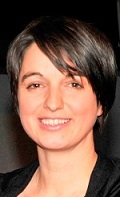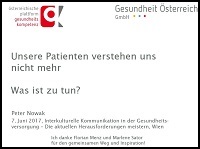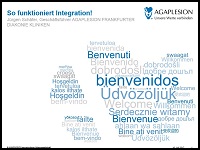Welcome and Introduction/ Moderators
 Gerhard Polak, Going International, Vienna, Austria
Gerhard Polak, Going International, Vienna, Austria
Gerhard Polak is CEO of the platform GOING INTERNATIONAL health information services. He provides the education and training online database »medicine & health«. He is the responsible editor of the GI-Blog, and the periodical editions of GI-mail. He has built up an EU-wide-network for training and education in the fields of medicine & public health. He is an experienced advisor for job and career in the health sector.
He worked as consultant Anaesthesia and Intensive care in Austria and as a delegate in Humanitarian Assistance missions in Africa, Asia and Central America.
 Holger Bienzle, die Berater, Vienna, Austria
Holger Bienzle, die Berater, Vienna, Austria
Holger Bienzle is head of the international platform bridges to Europe at die Berater. He has gained experience with European projects from different perspectives: as Austrian Grundtvig programme manager and advisor of project promoters, as external expert and evaluator for the European Commission and as manager of many European projects in research and education. Holger has been co-author on several publications and articles on European project management, networking and network management in education, and e-learning.
Defining the field
1st Lecture: Our patients don´t understand us anymore – What can we do?
Peter Nowak, Department „Health and Society“ at the Austrian Public Health Institute, Vienna, Austria
Patient-centred communication is at the heart of nursing and medical practice. But patient surveys in Austria (and elsewhere) underline that large parts of the population do not feel listen to and do not understand the information given by health professionals. What is necessary to do? The education programs seem to get better in recent years, still everyday routine in health care services do not set priorities in patient-centred communication and do not give time for necessary communication. A national strategy to improve health care communication sets new emphasis with three improvement strategies: inter-professional staff-empowerment, patient-empowerment and local organisational development. This input gives an overview over long-term initiatives and first implementation projects in Austria.
Keywords: Patient centred communication; national strategy; staff-empowerment; patient-empowerment; organisational development
Relevant links:
- Strategie zur Verbesserung der Gesprächsqualität in der Krankenversorgung (German website)
- Österreichische Plattform Gesundheitskompetenz (German website)
- Gesundheitsreform – Gesundheitskompetenz (German website)
Presentation: Presentation Peter Nowak (German)
Head of the Department Health and Society at the Gesundheit Österreich GmbH (Austrian Public Health Institute), Vienna, Austria. Current focuses of work: National strategies in health promotion, health literacy, patient centred care, communication in healthcare.
2nd Lecture: Integration that works! A report of 15 years´ experience
Jürgen Schäfer, Agaplesion Frankfurter Diakonie Kliniken, Frankfurt, Germany
In order to counter the imminent shortage of skilled workers in hospitals and nursing homes, the department for international recruiting was founded in AGAPLESION at the corporate level and a concept for recruitment and integration of nurses from abroad was developed.
The AGAPLESION FRANKFURTER DIAKONIE KLINIKEN, the subsidiary of AGAPLESION gAG, have been recruiting nurses from all over the world, especially from European Union for 15 years. Ca. 250 nurses without German citizenship are working here. Most of them have been recruited or have found the way directly to us in the last 15 years.
For a successful integration, certain conditions were created in the facilities, such as support from mentors, free language courses, welcoming culture etc. Another important point of successful integration is to strengthen the intercultural competencies of the staff, especially of the managers, since often they make the decision whether the integration succeeds or fails.
When recruiting the foreign staff, we should not concentrate only on resolving the lack of staff but more importantly on acquiring highly qualified staff with distinctive knowhow.
Recruitment from abroad should not be seen as an emergency solution, but as an important complementary measure. Cultural diversity promotes innovation and creates positive potential through a team of employees. However, diversity must be appreciated and valued. The prerequisite is an open and social working environment, which allows different experiences and opinions.
Recruitment and integration of foreign nurses as a component of staff recruitment is an intensive work, but worthwhile and without alternative for the urban areas in Germany.
Keywords: Human Resources; Integration; Intercultural competences; Nursing staff from abroad
Relevant links:
- Homepage Agaplesion Frankfurter Diakonie Kliniken (German website)
- Agaplesion – International Applications
- Make it in Germany
- Regierungspräsidium Darmstadt, Hessen – Anerkennung ausländischer Abschlüsse (German website)
Presentation: Presentation Jürgen Schäfer (German)
CEO of AGAPLESION FRANKFURTER DIAKONIE KLINIKEN GmbH and Head of Environmental and Energy Management of AGAPLESION AG. Honorary Professor of University of Pécs, Hungary, Bachelor Professional (CCI) of Human Resources, Management Human Resource Management DAG, Paramedic and Instructor for Paramedics, Member of Examination Board and Instructor (CCI) for Health Services Clerks, CCI Frankfurt am Main.
3rd Lecture: „How the body?“ Intercultural communication in Humanitarian Assistance
Petra Haderer, Doctors without borders, Vienna, Austria
Médecins Sans Frontières (MSF) / Doctors without Borders provides medical care in approximately 70 countries often under precarious safety conditions and time pressure with the main
objective of saving lives and reducing suffering. In order to be able to intervene effectively in an acute crisis situation such as an armed conflict in Yemen or an Ebola epidemic in Sierra Leone, one requires not only medical know-how, extensive logistics capability, and high staff resilience, but also the competent handling of interpersonal communication.
As humanitarian aid workers we constantly and repeatedly ask ourselves: Are we reaching the individuals who are most in need of our services and messages? Do we understand correctly what our patients are telling us? Has everything been verbalized, or is there essential information which remains unsaid?
In Sierra Leone, „How da body?“ is a very common greeting meaning, „How are you?“, and relies on the assumption that only if the body is healthy can one be well. This is one example of how successful communication and a common language understanding requires awareness of the respective sociocultural context and non-western logic processes.
„Get the meaning, not the words,“ is a basic rule for intercultural communication and is also applied in the field of international humanitarian aid in order to successfully respond to the medical needs of local populations.
Keywords: Humanitarian Aid, Communication, Security, Respect, Efficiency
Relevant links:
- Ärzte ohne Grenzen Österreich (German website)
- MSF Austria – Guidance document
- Geneva Centre for Education and Research in Humanitarian Action
 Petra Haderer works in the Vienna office of the international humanitarian relief organization Médecins Sans Frontières (MSF) as a human resources officer and has been recruiting and advising humanitarian staff for 12 years. She has a professional background in medical laboratory science and has worked as a Laboratory technician in humanitarian projects in Bolivia, Angola and Sierra Leone. Since obtaining a master’s degree in Intercultural Competence in 2011, she has also worked extensively as a field trainer for Intercultural Communication and the Management of Intercultural Teams. She lives with her family in Vienna.
Petra Haderer works in the Vienna office of the international humanitarian relief organization Médecins Sans Frontières (MSF) as a human resources officer and has been recruiting and advising humanitarian staff for 12 years. She has a professional background in medical laboratory science and has worked as a Laboratory technician in humanitarian projects in Bolivia, Angola and Sierra Leone. Since obtaining a master’s degree in Intercultural Competence in 2011, she has also worked extensively as a field trainer for Intercultural Communication and the Management of Intercultural Teams. She lives with her family in Vienna.
Published in GI-Mail 07/2017 (English edition). Sign up for GI-Mail here. Tip: More up to date educational events can be found online in the Education Database »medicine & health«.


